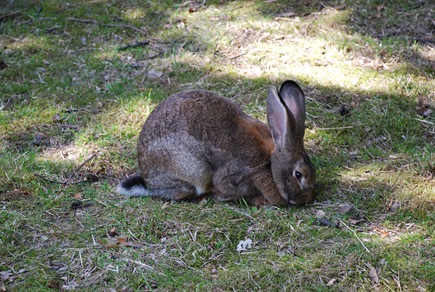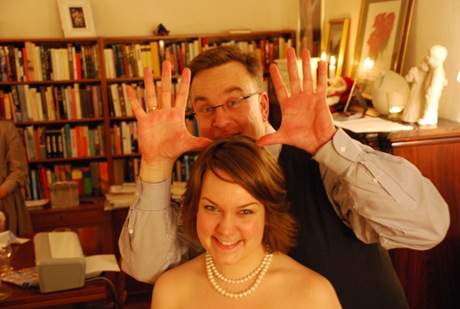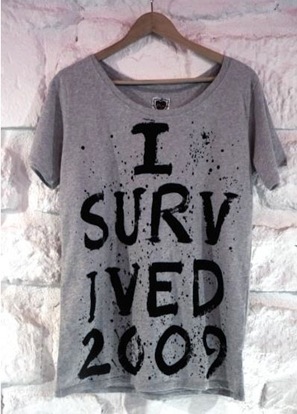« December 2009 | Main | February 2010 »
January 31, 2010
Verdien av Precious
Bør du se den som samfunnskritikk eller enkeltstående drama? Svar: Bare se den.
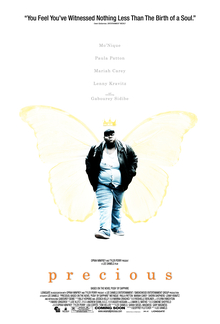 En film om en overvektig, fattig, mishandlet, svart 16-årig tobarnsmor som lærer å lese kan feile på så mange måter. Precious kunne blitt en klisjéfylt tårefremkaller eller et følelsesløst, voldelig sjokk. Eller den kunne vært en dypt deprimerende film som du vet er bra, men aldri orker å se. Regissør Lee Daniels tok på seg et risikabelt prosjekt da han filmatiserte romanen Push av Sapphire. Men publikum har reagert med jubel (15 minutters stående applaus ved Cannes-festivalen) – og med debatter om hudfarge, fattigdom og barnemishandling.
En film om en overvektig, fattig, mishandlet, svart 16-årig tobarnsmor som lærer å lese kan feile på så mange måter. Precious kunne blitt en klisjéfylt tårefremkaller eller et følelsesløst, voldelig sjokk. Eller den kunne vært en dypt deprimerende film som du vet er bra, men aldri orker å se. Regissør Lee Daniels tok på seg et risikabelt prosjekt da han filmatiserte romanen Push av Sapphire. Men publikum har reagert med jubel (15 minutters stående applaus ved Cannes-festivalen) – og med debatter om hudfarge, fattigdom og barnemishandling.
Det vil bli spennende å se hvordan filmen blir tatt i mot i Norge. Her vil enda færre av filmens seere kjenne seg igjen i 1980-årenes Harlem i New York City. Den grunnleggende historien er universell – eller er den det? På sett og vis er det nettopp det spaltister, anmeldere og bloggere har diskutert de siste tre månedene: Handler Precious om Precious, eller handler den om USA?
Handlingen kan i hvert fall beskrives slik: I 1987 blir Precious kastet ut av skolen fordi hun er gravid igjen. Barnets far er – som forrige gang – hennes egen far. Precious begynner på en alternativ skole og møter for første gang en lærer som gjør et skikkelig forsøk på å nå frem til henne. Hjemme hos moren Mary – fantastisk spilt av Mo'nique – får Precious ingen støtte. Mary ga engang datteren et navn som betyr “verdifull”, men nå misbruker hun henne fysisk, psykisk og seksuelt. Hver dag blir Precious minnet om at hun ikke er verdt noe som helst.
Når denne bekmørke handlingen ikke etterlater publikum i håpløse tårer, er det mye takket være filmens hovedperson, spilt av nykommeren Gabourey Sidibe. Fortellerstemmen hennes og bildene vi får se av hennes eget indre liv – hvor hun går på en rød løper, synger, danser og ikke minst smiler – gir filmen noen øyeblikk med nødvendig humor og glede. Heldigvis taes heller ikke de enkleste gråtfremkallende Hollywood-triks i bruk. Filmens oppbygging er mer som en dokumentar enn et tradisjonelt drama. Det finnes ingen triumferende klassisk musikk idet Precious overvinner alle hindringer, ingen sentimentale monologer og fremfor alt ingen enkle løsninger. Filmen vil at vi skal tenke, ikke gråte. Det nærmeste filmen kommer en fasit er å antyde at utdannelse er veien opp.

Anmeldere har både rost og kritisert filmen som “en film om rase”, men Precious avslører flere lag med ubehagelige fordommer også mellom svarte amerikanere. Precious ønsker seg en “lyshudet” (altså ikke nødvendigvis hvit) kjæreste, og filmens slanke, pene og lyshudede personer er de mest vellykkede. Som en kontrast til disse er Precious og moren ikke bare tunge og mørke, men også uvitende og fattige trygdemisbrukere. Filmen kan vekke avsky hos publikum som ikke kjenner seg igjen i filmens miljø. “Jeg liker McDonalds” sier Precious til en sykepleier som foreslår organiske grønnsaker i stedet – som om organiske grønnsaker ville vært et reelt alternativ for en trygdet sekstenåring i Harlem i 1987.
“Er USA klar for denne filmen?” spurte New York Times to uker før USA-premieren. Det er ofte historiens kontekst som har blitt anmeldt. Det kan være fordi filmen er påfallende lite fokusert på verden rundt hovedpersonen, selv om Precious selvfølgelig ikke lider i et vakuum.
Kanskje filmen hadde tjent på en mer detaljert skildring av samfunnet rundt Precious. Det er sjelden vi blir minnet på at handlingen foregår på åttitallet. 1987 var etter at crack kokain hadde inntatt Harlem, men før bydelen ble pusset opp og New Yorks politi ble strengere. Vi kommer heller ikke inn på menneskene utenfor leiligheten til Mary og Precious. De virker nærmest feilfrie, selv når de ikke klarer å hjelpe hovedpersonen. Mo'nique skildrer Mary som et offer og en psykopat på samme tid, men selv hennes kompliserte rolletolkning etterlater oss i uvisshet. Er Precious et worst-case-scenario for å banke inn en moral, virkeligheten for alt for mange barn, eller rett og slett en enkeltstående fortelling? Trenger vi å bry oss, eller er filmens miljø for langt borte i tid og sted?
 Kanskje vi bare skal bestemme oss for at debattene ikke betyr noe. Kunstverk bør ikke alltid oppleves som samfunnskritikk. Precious kjemper en indre kamp gjennom å lære seg å skrive ned sin egen historie, og det gjør filmen severdig i seg selv.
Kanskje vi bare skal bestemme oss for at debattene ikke betyr noe. Kunstverk bør ikke alltid oppleves som samfunnskritikk. Precious kjemper en indre kamp gjennom å lære seg å skrive ned sin egen historie, og det gjør filmen severdig i seg selv.
Hva slags skole gir toppkarakterer til en elev som ikke kan lese, så lenge hun holder kjeft? Hvilken bestemor kan se sitt barnebarn og tippoldebarn bli utnyttet og misbrukt, uten å gjøre mer enn å riste på hodet? Hvordan kan et velferdssystem gjøre det så enkelt å falle gjennom? Og hvordan kunne Mary bli en så grusomt dårlig mor? Det finnes dokumentarfilmer og fagbøker som forsøker å svare. Se Precious fordi den vil få deg til å stille spørsmålene.
Precious:
- Amerikansk drama fra 2009
- Norgespremiére 29.01.2010
- Regissert av Lee Daniels
- Med Gabourey Sidibe, Mo'nique, Paula Patton og Mariah Carey
- Filmweb
- imdb
Posted by Julie at 12:06 PM | Comments (2) | TrackBack
January 28, 2010
Eplesett! Reaksjoner på iTingen
Da jeg først leste at den nyeste iGreia var en "iPad", trodde jeg at en av mine nye kollegaer i E24 hadde funnet på ordet utelukkende til forsidetittelbruk. Det måtte være et ordspill basert på et sitat tatt ut av sammenheng. For de kunne vel ikke seriøst ha kalt produktet iBind? Jo, det gjorde de visst.
Hadde jeg vært på jobb i dag, ville jeg sikkert skrevet om dette på en seriøs måte. I stedet har jeg sittet hjemme og ledd av at absolutt alle jeg følger på Twitter latterliggjør iDingsen (iBomsen?)
Silicon Angle har samlet førsteinntrykkssitater. Gizmodo gir oss 8 grunner til å ikke juble for iSaken. Geek Girls Guide lurer på hvorfor ingen jenter hindret det tåpelige navnet - som viser seg å være funnet på av MadTV. Bare noen timer etter lanseringen har Jezebel samlet internetts beste vitser om iPad.
På norsk kan vi bruke "padde" fremfor "pad". Det gir (litt) bedre assosiasjoner, men det var vel fortsatt ikke det Steve Jobs ønsket.
Ifølge geniale Stuff Journalists Like liker jeg å skrive om Apple. Men selv om dette overhodet ikke er en ny eller original ting å si, så er dagen i dag en fin anledning til å si det: Jeg er så lei.
Jeg er lei av iMennesker som sier "Kan jeg koble mac-en min til internett her?" Det irriterer meg mer enn jeg liker å innrømme når jeg selv sier "iPod" om mp3-spilleren jeg bruker (som jeg faktisk arvet, merkelig nok). For jeg sier kameraet, kaffemaskinen og mobiltelefonen. Ikke Nikonen, Isomacen og Sony Ericssonen.
Jeg er lei av at folk ser på "Apple vs. Microsoft" som en vesentlig debatt. Jeg har fått høre "Dere passer så bra sammen. Dere er jo hundemennesker og Windows-mennesker begge to!" Og jeg har fått høre "Hvorfor har ikke du iPhone? Du er en sånn person som har iPhone!" Hva slags freak er jeg som passer inn i begge kategoriene?
Jeg har ikke iPhone fordi jeg ikke har iCash. For å sitere Eirik Newth, "Epleskatten blir for drøy". (Og jeg kan være teknologijournalist uten å eie Apple-produkter, siden jeg kan være økonomijournalist uten å eie penger.)
Det går an å skrive alvorlig (The "Apple Advantage" is class signalling and always has been) eller morsomt (Apple innfrir: Ny duppeditt like jævla dyr som forventet) om det, men konklusjonen er den samme. Det er snakk om statussymboler og markering av identitet. Og det er helt greit det, men det er latterlig når mennesker som hevder at de ikke bryr seg om mote, må ha det nyeste fra Apple fordi de er så teknologi-interesserte. De virkelig teknologi-interesserte menneskene jeg kjenner, har ikke mac.
Én ting har likevel Apple gitt oss. Jeg synes eplesette er et mye finere alternativ til angre enn kontrollsette.
Posted by Julie at 12:54 AM | Comments (4) | TrackBack
January 26, 2010
Jakten på en død manns liv
Men hvem var du, egentlig? Hadde du noen? Det skal ta Magasinet 550 telefoner, en flere uker lang, tung reise ned i Oslos glemte verden, før vi nærmer oss noen svar.
22. oktober 2009 ble Jan Erik Fosshaug begravet uten en eneste venn eller pårørende til stede. Bernt Jakob Oksnes har skrevet om letingen etter den ensomme mannens livshistorie i Dagbladet Magasinet.
Jeg er glad for at norsk journalistikk kan være så stillferdig, grundig og rørende som dette.
Posted by Julie at 9:03 PM | Comments (3) | TrackBack
Fur issues, part 3: Organic, fair-trade, free range coats
I'm surprised the Norwegian fur industry hasn't gotten its act together by now.
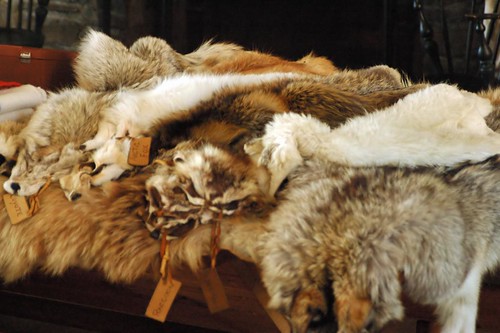
Let's examine the evidence:
1. Norway is a rich country, but Norwegians claim to be down to earth and sensible. So Norwegians love politically correct, expensive status symbols.
2. A Norwegian writer recently used this country's winter weather as evidence that God's world-creating talent is grossly overrated. You would think we were willing to buy anything that could keep us warm.
3. Free range meat, eggs and dairy are sold in many Norwegian supermarkets. This indicates that plenty of Norwegians care about animal rights, but are still ok with killing animals so human beings can be happier.
4. Vegan footwear exists. Marketing fashion as politically correct seems to work.
5. I count Norwegian tap water among my favorite drinks. I miss it when I'm outside the country. But selling Norwegian bottled water to people in Norway who own sinks, turned out to be a successful business plan. We will clearly pay money for anything.
In all seriousness, why does the fur industry not attempt to capitalize on the consumer demand for "ethical" luxury?
After a dissapointing fall season for the fur industry, the unusually cold winter has driven Norwegian fur sales up, leading to more debate about animal cruelty. In this VG article, a spokesperson for Pelsinform says fur farmers who mistreat their animals are a far greater threat to the industry than animal rights activists or fur boycotts are. I think that's true.
As I've tried to explain before, killing animals for fur isn't basicly any worse than killing them for meat. But if the fur industry really is crueller than the meat industry, then of course they shouldn't be allowed to get away with it.
My advice: Make sure the animals are treated well until they die as peacefully and painlessly as possible. And then make sure consumers know about that.
This is Part 3, in which I give the fur industry some marketing advice. You should also read
- Part 1, in which an ethical dilemma turns up literally on my doorstep, in the form of a white rabbit fur vest
- Part 2, in which I make a more serious attempt to discuss fashion as if it were a topic in ethics class.
Photo: .jowo. CreativeCommons
Posted by Julie at 1:08 PM | TrackBack
January 25, 2010
Too busy to write, so I’ll teach you how to read

Long-time readers may know what this picture means: I am literally buried in word-related work. Except now, in 2010, there are fewer books and more computer files to be read, written, edited, sent and uploaded. So the buried part is not so literal anymore.
While I write a news article, a media commentary column, a movie review and a summary of a book chapter, you can read How to win at reading academic articles from the blog An Improbable Fiction.
Like the author of that post, I spent my time at university struggling with the dual burdens of popularity and belief that I could take on extra courses. But I managed, because I can (usually) read and understand things pretty quickly. You can too! There are many, many techniques for doing so, but today, I'm recommending a combination of reading and note-taking described here.
Posted by Julie at 10:06 AM | Comments (2) | TrackBack
January 24, 2010
Fur issues part 2: Attempting to make sense
A response to comments on:
- Part 1, in which an ethical dilemma turns up literally on my doorstep, in the form of a white rabbit fur vest.
Eva writes that last week's post about fur didn't address the issue of animal cruelty in the fur industry enough. I actually barely addressed it at all.
That fur is wrong because it hurts animals is the foundation for the whole fur debate. It's the basic assumption underlying all the confusion in my head (which Martine called "witty" in her comment).
 However there is the difference between "Fur is wrong because animals die" and "Fur is wrong because the fur industry mistreats animals and then they die".
However there is the difference between "Fur is wrong because animals die" and "Fur is wrong because the fur industry mistreats animals and then they die".
The first sentence makes logical sense, but I disagree with it. I happen to think that killing animals for food is ok. (I had a tuna sandwich today.) So I have to think that killing animals for clothing is ok. (I wore leather boots while I ate the sandwich.)
The second sentence does not make sense. Animal cruelty is wrong. Fur in itself is not automatically wrong because of this.
I don't know that much about the issue of animal cruelty in the fur industry. Also (and this is actually the important part): I don't know that much about animal cruelty in the meat/fish/egg/dairy industries either, not to mention all the other industries I support each day. And that's why I've worn fur a handful of times. Because being anti-fur would be hypocritical. It would mean arbitrarily "boycotting" something that I have never bought anyway, while continuing to support industries that may or may not be just as bad.
 My conclusion in part 1 was that, given that fur is one of the many reasons human beings kills other species, and given my insufficient knowledge of the amount of harm I was inflicting on other living creatures, to be against fur I should also be against meat, fish and leather (definitely, because animals have to die for me to have this), plus silk, eggs, dairy and probably a lot of fruits and vegetables (probably, because animals are very likely to die so that I can have these things). And I don't want to be naked and hungry.
My conclusion in part 1 was that, given that fur is one of the many reasons human beings kills other species, and given my insufficient knowledge of the amount of harm I was inflicting on other living creatures, to be against fur I should also be against meat, fish and leather (definitely, because animals have to die for me to have this), plus silk, eggs, dairy and probably a lot of fruits and vegetables (probably, because animals are very likely to die so that I can have these things). And I don't want to be naked and hungry.
I'm not saying "I simply don't want to care about animals." I'm saying that as long as I'm not a vegan, I have no reason to be against fur in itself. It would be like saying "Minks deserve to live, but fish don't."
Being ok with fur doesn't mean I can't be against specific animal cruelty. And yes, the idea that the fur industry does a lot of cruel things is one of the reasons I have never particularly wanted fur. In part one, I wrote: "I had never seriously considered buying a fur coat in the same way I've never seriously considered buying a pair of Prada pumps or a Burberry trench coat: I don't have that kind of money." However, I have wanted Prada pumps and a Burberry trench coat.
Full disclosure: I have never bought any real fur. I have worn (daily for two seasons) a coat with a fur collar, which my grandmother had worn decades earlier. The collar was supposedly wolf, but I honestly don't know. That coat had a rabbit fur lining, which I removed and never wore. I have also borrowed mink scarves and collars for specific occasions, including a costume party, from family members. The other women in my family wear fur. I was given a rabbit fur vest, which I returned after wearing twice.
Related links:
- Here's a video (Norwegian news clip) about cruelty to chickens. (Norwegian)
- My journalism classmate Jorunn Gaarder wrote a very balanced feature article about the fur debate. It was adapted into a news story and published in the Norwegian newspaper VG, but not online. If you have access to the archive Atekst, you can read the VG article here. (Norwegian)
- Anne Viken, a Norwegian free-lance journalist and veterinarian, has written articles about marketing products as "ethical" and what's really behind labels like "local food" and "organic food". Here's one of them. There are more articles about food on her blog. (Norwegian)
- IFTF is the international organization for fur trade, both farmed and wild fur. Pelsinform is the Norwegian equivalent.
This is Part 2, in which I make a more serious attempt to discuss fashion as if it were a topic in ethics class. Continue to:
- Part 3, in which I give the fur industry some marketing advice.
(Images by The Sartorialist)
Posted by Julie at 6:57 PM | TrackBack
January 18, 2010
Fur issues
I've been thinking about fur lately. It's one of those trains of thought that simply will not go away, as if my mind were saying: "Write this down! Sort this out! Get to the bottom of this!" over and over and over. Especially after my mom showed up at my door with a rabbit fur vest for me.
Rabbit. My mother informed me yesterday that "We don't eat rabbit," because we used to have a live one. But that didn't stop her from buying rabbit fur the week before. And when she gave it to me, we had the following conversation:
"What's this, Mom?"
"It's rabbit."
"It's RABBIT!?"
"It's rabbit!!! :-)" (Yes, you could hear the smiley at the end of her spoken sentence.)
"But Mom, it's rabbit."
"Well, just tell people it's mink."
Now, with a few notable exceptions, I usually think my mom has good taste and style. Plus, the vest fits, it's warm, and I recently added "It's cold outside," to my list of all-purpose excuses. (The list also includes "At least I don't smoke." and "I was living in Lier when I did that.") But since I'm a nerd who sees over-analyzing as a hobby, my brain won't stop internally debating how to feel about this recent addition to my closet. So far, I have come to the following conclusions:
1. Wearing fur sends a message. It says: "I'm ok with the fact that what I am wearing used to be alive." But so does wearing leather and silk.
2. In many cases, fur also sends the message: "I spent A LOT of money on something that makes me look box-shaped." (This vest doesn't; the opossum coat my mom tried to make me borrow, does.)
3. Fur is expensive. So is foie gras, another luxury item associated with animal cruelty. "Sacrificing" the things you can't actually afford, is not sacrificing. I'm not going to earn any karma points by pretending that I don't have a car because of the environment. I don't have a car, because I don't need one and I can't afford one. I rarely eat fois gras, because I can only rarely afford it. I had never seriously considered buying a fur coat in the same way I've never seriously considered buying a pair of Prada pumps or a Burberry trench coat: I don't have that kind of money.
 4. I've heard people argue that wearing fur, even vintage fur from the 30s, is an indirect support of today's fur industry, because it keeps the look of fur in fashion. These same people suggested wearing realistic-looking faux fur. How does that not keep the fur look in fashion? People who claim to have made up their minds are clearly just as confused as me. "Don't get me started on fur. It makes me so angry," one friend warned when I mentioned my difficult gift. I glanced at her new suede coat and changed the subject.
4. I've heard people argue that wearing fur, even vintage fur from the 30s, is an indirect support of today's fur industry, because it keeps the look of fur in fashion. These same people suggested wearing realistic-looking faux fur. How does that not keep the fur look in fashion? People who claim to have made up their minds are clearly just as confused as me. "Don't get me started on fur. It makes me so angry," one friend warned when I mentioned my difficult gift. I glanced at her new suede coat and changed the subject.
5. Faux fur is not as warm. And it either looks nothing like fur or exactly like fur, and I think either one is screapy*. It is simply not an alternative in my opinion.
6. I've worn fur before (right), so I fail already.
7. Ideally, I would know the costs I inflict on the world whenever I choose to consume anything. How happy was the hen who laid these eggs? Exactly how did this turkey die? What are the working conditions of the people who made this cheap t-shirt? Was this imported fruit transported in the best way possible for the environment? Given that I don't know these answers, I am probably making the wrong decisions all the time, leading to uneccessary suffering. Who says that dying to become a fur vest is worse than dying to become Christmas dinner?
After reviewing this evidence, it seemed I had two choices, if I wanted my own actions to make sense. I could wear the fur. Or I could give up a whole bunch of my favorite things: all my boots, my preferred breakfast, my kimono, the only pyjamas I really like, traditional Thanksgiving - did I mention bacon?
So I wore it just long enough to realize a drawback I had forgotten: Rabbits shed their hair. So did my new vest. I will be returning it.
* Screapy: From scary and creepy. Something so stupid and off-putting that it kind of scares you. It's in Urban Dictionary now, but I made it up before I started this blog. I should mention that I was living in Lier at the time.
This is Part 1, in which an ethical dilemma turns up literally on my doorstep, in the form of a white rabbit fur vest. Continue to:
- Part 2, in which I make a more serious attempt to discuss fashion as if it were a topic in ethics class.
- Part 3, in which I give the fur industry some marketing advice.
Posted by Julie at 11:52 PM | Comments (8) | TrackBack
January 15, 2010
Book review: The Big Questions
 In The Big Questions, Steven E. Landsburg uses math, economics and physics to discuss questions of philosophy, especially morality and ethics.
In The Big Questions, Steven E. Landsburg uses math, economics and physics to discuss questions of philosophy, especially morality and ethics.
That sounds a lot more serious than the book turned out to be. In fact, Landsburg ends the book by saying that most of it was written "not to make any particular point but because it seemed to fit and I think it's interesting."
It's a good introduction to some basic econ, math and physics, and to Landsburg's own beliefs and guidelines on life (including the reasoning behind them). Many of the examples and anecdotes were old news to me, because I have already taken courses in math, physics, economics and philosophy. But it's well-written, entertaining and easy to read.
Favorites:
* If more people really and truly believed in the religions they claim to follow, they would behave differently. For example, why don't we have more suicide bombers? Landsburg concludes that hardly anyone is actually religious:
"If religious belief were as widespread as people claim it is, there should be millions upon millions of voluntary martyrs. (...) Believers in hell should commit fewer crimes; believers in heaven should take more risks; believers in one religion should interact in predictable ways with believers in another; believers in God should have a powerful interest in the alternatives. Those implications are testable. I am moderately confident that carefully gathered statistics would refute the hypothesis that religious beliefs are widely or deeply held."
* If you want to write, study something you love and write about it. Do not take writing classes:
"If your writing is murky, it's usually because your thinking is murky, too. The cure for that is not a series of writing exercises; it's to master your subject matter. (...) Prose flows easily when you understand what you're saying. If you're struggling to 'craft' your prose, you're probably confused."
* The Economist's Golden Rule: Don't leave the world worse off than you found it OR Don't spend valuable time and energy in non-productive ways. It follows that you should not steal, counterfeit or be an Olympic athlete:
"If you bake a cupcake, the world has one more cupcake. (...) But if you win an Olympic gold medal, the world will not have one more Olympic gold medalist. It will just have you instead of someone else."
Right:
Wrong:

(Cupcake by Kuidaore)
Posted by Julie at 2:52 PM | Comments (1) | TrackBack
Happy Moose Cap Friday!
It's the first Moose Cap of 2010! If you don't know what that means, you have so much to learn.
(The guy with the antlers is my dad.)
Posted by Julie at 12:13 PM | TrackBack
January 7, 2010
In need of another vacation
I am exhausted, so I will let another writer update you on my life post-Christmas:
"I do hope the festivities were kind to you, Best Beloveds. I myself spent the duration lying on the sofa and sincerely hoping that someone would shoot me through the forehead. I find there's nothing quite as effective as Christmas for bringing out all those especially rampant viruses – the ones The Body of the self-employed person saves for rapid deployment as soon as a proper holiday is declared. This is, quite simply, revenge upon The Mind for the rest of the year's truncated nights, double-booked evenings, hair-tearing afternoons and rewrite-and-email-haunted mornings."
To use Kennedy's phrases and capitalization: my Body took a vacation, or should I say, went on strike, as soon as my Mind decided to take time off after handing in The Research Paper.
Since time “persists merely as a consequence of the events taking place in it” and I didn't do anything during the holidays, my Mind believes that no time has passed since December 17th. This means that there has been no Christmas vacation.
As a result of this injustice, my Mind is threatening to go on strike. So, if this blog becomes quiet for a few more days than I would like, it's because I have temporarily stopped thinking.
Posted by Julie at 9:31 PM | TrackBack
January 2, 2010
2009 according to Julie
Warning: This is a completely subjective memoir of the year that was. It's written off the top of my head. My head, so it's going to be self-centered.
First the soundtrack:
Not necessarily the best songs of the year, but the ones that will remind me of 2009 for years to come. There are plenty of older songs that fit that description too, but these songs were released 2009 or late 2008.
Then my life:
2009 was the first year I was a full-time journalist. That is, I went to journalism school and survived on various part-time jobs as a journalist and editor. I was no longer a receptionist, tour guide or pointe shoe salesgirl. I was a journalist. That's probably a milestone.
If I had been told a year ago that 2009 would lead me to court rooms, a strip club, a pscychologist's office, the make-up and rehearsal rooms of the Norwegian Opera House and more concerts than I've attended during the rest of my life combined, I would not have believed it. While 2009 was happening, I kept thinking "2008 was so much more interesting," but looking back over the past 12 months, a lot happened. Nothing as big as moving to Paris and back again or drinking coke in the Cambodian jungle, but a lot of smaller dramas.
2009 was a year of extremes. I stayed up all night and slept all day, and then I got a job that started at 6 AM. I worked constantly and then spent a month doing nearly nothing. I forgot to eat some days and wanted to do nothing but cook on other days. I have been very sad and very happy this year. I have been very efficient and very lazy. I have been very stressed and very relaxed. I have felt invisible and I have been recognized by strangers. In a way, 2008 was the year things happened, and 2009 was the year when the consequences caught up with me, good and bad. And I finish this year feeling better about everything. I don't think I have been all around happier at the end of a year for as long as I can remember.
Current events:
In the world as in my own life, 2009 was very much about dealing with the consequences of 2008: The financial crisis continued, the same talk of climate change was repeated in Copenhagen, and Obama became president and eventually won the Nobel Peace Prize.
Besides that I will probably remember the riots in Oslo in January. (Or more precisely, I will remember waking up to five missed calls from my very worried mom. I attended the demo on January 8th, then spent the rest of the night in a basement rock pub oblivious to the broken windows and tear gas above me.)
The Khmer Rouge was on trial, but the story was so buried in other stuff that even I forgot to stay up-to-date on what was going on.
In less violent news, e-books kept popping up in both the news I read and the news I wrote. In February I touched a Kindle for the first time. In May my first article at my journalism internship was about the upcoming release of big-screen e-book-readers. And this Christmas, Amazon sold more e-books than paper books.
Meanwhile print media suffered, particularly the Boston Globe. While I studied the dwindling circulation figures on this side of the Atlantic, it seemed friends in Boston could judge the sad state of print media by the number of crying editors each week. But was it really that sad? I optimistically blogged about the future of journalism (English translation below), earning a somewhat unfair reputation as the only Norwegian journalism student who wants to work online.
Everyone talked about Twitter this year. Many of them specifically to tell me that they were not on Twitter and did not see the point. I found Twitter useful. It helped me get a job, find stories to write, discuss stories I was writing and brag about stories I had written. In other words, I used it as a journalism tool. It's hard to explain to sceptics why and in what way I think Twitter means something, but I think it does. (Meanwhile everything you need to know about Facebook is still available right here, and still true.)
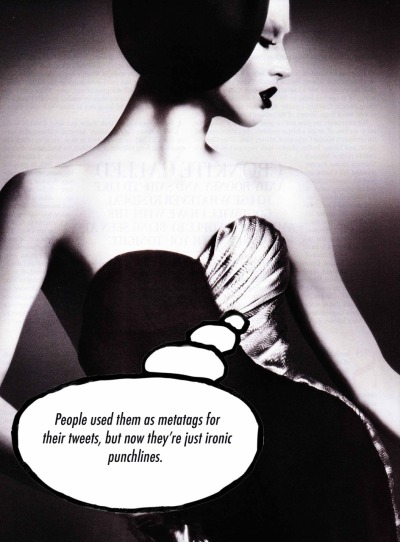
One hash tag I ended up using a lot was #krevsvar. It started as an outcry over one court ruling on online privacy. Then it turned into a general campaign to "demand answers" (or krev svar in Norwegian) from my country's politicians about IT politics, particularly piracy vs. privacy. I followed the story through the late spring and summer, and in the fall I attempted to summarize it all for non-IT-geeks.
IT politics ended up mattering very little for Norway's general election this year. Overall, I think we'll remember this election as kind of a boring one, no? I remember being more pumped about Cory Doctorow being in Oslo on the day of the election. Not that I don't care about political debates, but what were we really debating this time around? I argued that our political labels were outdated, coming relatively clean about my own politics in the process. But I still enjoyed the fact that general elections make political geekiness almost universally acceptable conversation. Until one sports-obsessed person pointed out that for every game, soccer fans reach the same level of excitement I get every fourth year when I wait for election results. (If you can relate to that, you might want to check out a soccer blog called The DA. Apparently, I might write for them sometime. How hilarious is that?)
End of the decade:
My earliest memory of the 2000s is my parents dancing. I don't remember the beginning of the 1990s. I talked to some friends who are only like two years older than me, and they mentioned the 90s as their defining decade: Although they have obviously moved on, the fashion, music and general pop culture of the 90s is the norm they started out with. I was only 13 when the new milennium began, and so I don't really feel like I can say anything about the 00s compared to any other time. As far as following culture, politics and fashion, I have really only known this one decade (and I don't even know the name of the new one). Before that, I was a child. But now I feel nearly old, because I find the following thought scary:

Some blog posts I wrote in 2009:
Welcome to 2010 everyone!
Image sources: ArtyDandy, ModelsAreSmart and xkcd
Posted by Julie at 12:25 AM | Comments (2) | TrackBack
